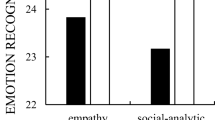Abstract
The purpose of this study was to assess the perceptions of emotions by accepted and rejected children. Peer ratings and peer sociometrics were used to identify accepted and rejected children. All children were administered a task specifically designed to measure their ability to perceive emotions. This task consisted of a series of videotaped interactions involving two individuals—either two adults or two children—portraying one of three affective states: happiness, sadness, and anger. After viewing each interaction, children were asked to identify what the person was feeling. In addition, teachers and peers rated the children on their ability to perceive emotions in others. The results indicated that accepted children obtained significantly higher scores than rejected children on the identification of emotions in the interactions. Teachers and peers also rated accepted children as better perceivers of emotions than rejected children. Implications of the results are discussed.
Similar content being viewed by others
References
Asher, S. R., and Hymel, S. Children's social competence in peer relations: Sociometric and behavioral assessment. In J. D. Wine and M. D. Smythe (Eds.),Social competence. New York: Guilford Press, 1981.
Berndt, T. J. Relations between social cognition, nonsocial cognition, and social behavior: The case of friendship. In J. H. Flavell and L. Ross (Eds.),Social cognitive development. New York: Cambridge University Press, 1981.
Borke, H. Interpersonal perception of young children: Egocentrism or empathy?Developmental Psychology 1971,5 263–269.
Cowen, E. L., Pederson, A., Babijian, H., Izzo, L. D., and Trost, M. A. Long-term follow-up of early detected vulnerable children.Journal of Consulting and Clinical Psychology 1973,41 438–446.
Deutsch, F. Observational and sociometric measures of peer popularity and their relationship to egocentric communication in female preschoolers.Developmental Psychology 1974,10 745–747.
Dodge, K. A., and Frame, C. L. Social cognitive biases and deficits in aggressive boys.Child Development 1982,53 620–635.
Ekman, P., Friesen, W. V., and Ellsworth, P.Emotion in the human face: Guidelines for research and integration of findings. New York: Pergamon, 1971.
Feshbach, N. D., and Roe, K. Empathy in six- and seven-year olds.Child Development 1968,39 133–145.
Ford, M. E. Social cognition and social competence in adolescence.Developmental Psychology 1982,18 323–340.
Gottman, J., Gonso, J., and Rasmussen, B. Social interaction, social competence, and friendship in children.Child Development 1975,46 709–718.
Green, K. D., and Forehand, R. Assessment of children's social skills: A review of methods.Journal of Behavioral Assessment 1980,2 143–159.
Green, K. D., Forehand, R., Beck, S. J., and Vosk, B. An assessment of the relationship among measures of children's social competence and children's academic achievement.Child Development 1980,51 1149–1156.
Green, K. D., Vosk, B., Forehand, R., and Beck, S. An examination of differences among sociometrically identified accepted, rejected, and neglected children.Child Study Journal 1981,11 117–124.
Harris, P. L., Olthof, T., and Terwogt, M. M. Children's knowledge of emotion.Journal of Child Psychology and Psychiatry 1981,22 247–261.
Hudson, L. M. On the coherence of role-taking abilities: An alternative to correlational analysis.Child Development 1978,49 223–227.
Hughes, R., Jr., Tingle, B. A., and Sawin, D. B. Development of empathic understanding in children.Child Development 1981,52 122–128.
Izard, C. E.The face of emotion. New York: Appleton-Century-Crofts, 1971.
Johnson, D. W. Affective perspective taking and cooperative predisposition.Developmental Psychology 1975,11 869–870.
Kagan, S., and Madsen, M. C. Rivalry in Anglo-American and Mexican children of two ages.Journal of Personality and Social Psychology 1972,24 214–220.
Kazdin, A. E.Research design in clinical psychology. New York: Harper & Row, 1980.
Kohlberg, L. Stage and sequence: The cognitive-developmental approach to socialization. In D. A. Goslin (Ed.),Handbook of socialization theory and research. New York: Rand-McNally, 1969.
Kurdek, L. A. Structural components and intellectual correlates of cognitive perspective taking in first-through fourth-grade children.Child Development 1977,48 1503–1511.
Kurdek, L. A., and Rodgon, M. M. Perceptual, cognitive and affective perspective taking in kindergarten through sixth grade children.Developmental Psychology 1975,11 643–650.
Morrison, R. L., and Bellack, A. S. The role of social perception in social skill.Behavior Therapy 1981,12 69–79.
Paulauskas, S. L., and Goddman Campbell, S. B. Social perspective-taking and teacher ratings of peer interaction in hyperactive boys.Journal of Abnormal Child Psychology 1979,7 483–493.
Piaget, J.The language and thought of the child. London: Rutledge & Kegen Paul, 1926.
Richard, B. A., and Dodge, K. A. Social maladjustment and problem solving in school-aged children.Journal of Consulting and Clinical Psychology 1982,50 226–233.
Rothenberg, B. Children's social sensitivity and the relationship to interpersonal competence, intrapersonal comfort, and intellectual level.Developmental Psychology 1970,2 335–350.
Rubin, K. H. Egocentrism in childhood: A unitary construct?Child Development 1973,44 102–110.
Shantz, C. U. The development of social cognition. In E. M. Hetherington (Ed.)Review of child development research. Chicago: University of Chicago Press, 1975.
Turnure, C. Cognitive development and role-taking ability in boys and girls from 7 to 12.Developmental Psychology 1975,11 202–209.
Vosk, B., Forehand, R., Parker, J., and Rickard, K. A multi-method comparison of popular and unpopular children.Developmental Psychology 1982,18 571–575.
Author information
Authors and Affiliations
Rights and permissions
About this article
Cite this article
Vosk, B.N., Forehand, R. & Figueroa, R. Perception of emotions by accepted and rejected children. Journal of Behavioral Assessment 5, 151–160 (1983). https://doi.org/10.1007/BF01321447
Accepted:
Issue Date:
DOI: https://doi.org/10.1007/BF01321447




